All
Equipping Your Fuel Trucks
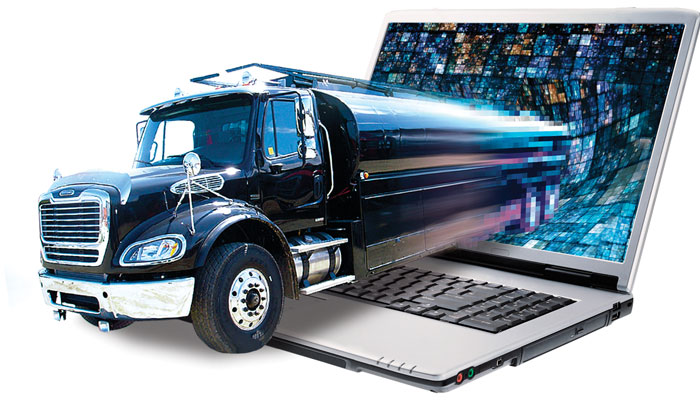
Manufacturers share thoughts on how to outfit your fleet for success
Oilheat and propane delivery trucks are the backbone of any fuel delivery operation, and their performance can vary widely depending on the equipment you use on board. In this issue, Oil & Energy is taking a look at truck equipment and mobile technology and providing food for thought for fleet owners. We would like to thank the manufacturers and vendors who took the time to participate in our coverage.
Blackmer
Blackmer has updated its line of TXD sliding vane pumps for refined fuels with the addition of a Piston Air Valve. Replacing a diaphragm style valve, the Piston Air Valve uses flourocarbon (FKM) elastomers that make the design more compatible with the additives used in today’s fuels, according to Scott Jackson, Blackmer’s Product Manager for the Americas. “The biggest advantage is the use of FKM,” Jackson said. “Better compatibility means longer life and less maintenance.”
Jackson said Blackmer’s TXD pumps support productivity and profitability through their reliability. “Simply put, Blackmer products give customers peace of mind because of the quality of the products,” he explained. “Up-time is what delivery companies want. Their trucks only make money when they are delivering product. Having a long-lasting, dependable and reliable pump under the truck gives customers that peace of mind.”
For refined fuels, the TXD Series is the core product that comes in variety of models and sizes. Flow rates range from 20 to 500 GPM and pressures up to 125 PSI. Blackmer also offers a high-speed version of the TXD pumps that can be operated at maximum speed of 1,200 RPM and provides the same flow rate performance as the slower speed pumps. There are also accessories such as T-Strainers, pneumatic relief valves and hydraulic motor adapters. The company backs its pumps with a 60-month warranty or 66 months from date of shipment.
For the LPG market, Blackmer provides two truck-mounted pumps – TLGLF3C and TLGLF4B. These are flange mounted pumps that bolt to the belly valve of LPG bobtails and transports and feature patented, replaceable cavitation suppression liners, replaceable end discs, non-metallic Duravanes and Blackmer mechanical seals. The pumps are UL listed for use on propane, butane and anhydrous ammonia. Accessories include a variety of flange options and hydraulic drive adapters. Blackmer offers a 48-month warranty from installation or 54 months from date of shipment.
Jackson said the sliding vane design offers efficient positive displacement pumping. “As the pump rotates, it moves a certain amount of liquid with each revolution. The sliding vanes self-adjust for wear to maintain that same flow rate and efficiency for a long period of time,” he explained. “When the flow rate finally does become reduced, the pump can quickly and easily be repaired by replacing the vanes with a new set, often without removing the pump from the installation location.”
Total Control Systems
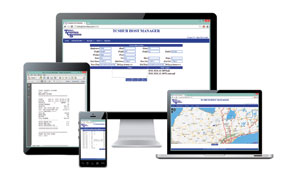
Total Control Systems’ TCSHub data can be viewed online from any device.
Total Control Systems is creating a new opportunity for fuel dealers to automate the transfer of data gathered during fuel delivery with its TCSHub software.
TCSHub is software that operates along with Total Control Systems’ TCS3000 intelligent register over the Internet to capture delivery information from the register and make it available for use in the back office.
Dan Murray, Vice President of Total Control Systems, said TCSHub is an economical solution for transferring data from the register for companies who have yet to integrate their register to a back office or handheld computer or tablet. It also can provide additional data to in-truck solutions compared to traditional electronic registers.
“There is a huge market of people who know they need another level of automation, but in-truck billing is too much for them. We can help them get that automation,” he explained. “If we can make your operation much more efficient, have data integrated and do that with less manpower, we’re meeting our goal of making small operators as efficient as the bigger guys.”
Data can be transmitted live from the TCS300 to TCSHub using a cellular connection, or at the end of the driver’s shift via radio modem. Data is transmitted to the TCSHub, which resides in the cloud, where it can be viewed and downloaded via an Internet portal, Murray said. If they prefer, users can have information hosted on their own servers or a PC with TCSHub middleware.
Total Control developed TCSHub to take advantage of the intelligence built into its TCS3000 register, which has its own CPU and memory. Murray said TCSHub and the TCS3000 are evolving products that “will probably be completely different a year from now.” He expects the capabilities to become more robust, giving customers added benefits with each software update.
Total Control developed TCSHub for the aviation sector, which typically has more challenging data requirements than residential or commercial fuel delivery. As such, its capabilities are plenty robust for most fuel companies, he said.
TCSHub could be particularly useful in any kind of wet hose operation, such as fleet refueling, through manual data entry or wireless RFID readers incorporated directly into the TCS3000 register. “We are trying to provide an economical solution that integrates all data and reports it in one place,” he added. TCSHub can also send delivery information to designated recipients by text or e-mail, and it offers optional GPS tracking, so companies that choose cellular transmission can see where all their vehicles are at all times. Total Control Systems do not offer vehicle routing by GPS.
Customers can handle the delivery data according to their own needs and feed it into back-office software, according to Murray. They can also choose four custom data fields to be associated with each delivery. Data can be exported from the truck as XML, SQL or CSV or almost any other format. Each delivery can be treated as one data file and can be viewed as a PDF.
Shawn Kiefer, Sales Manager, said TCSHub can help reduce fraud, errors, and lost tickets because it delivers comprehensive delivery data that allows companies to account for every gallon of fuel on the truck.
Boston Steel
David Burke, President of Boston Steel, a Malden, Mass.-based truck tank builder, told Oil & Energy that one of the key decisions when purchasing a truck is tank size, whether it be for home heating, refueling or any other delivery usage. “This is a cost versus long-term savings decision,” he said.
When purchasing, one should consider driver expense, chassis maintenance, cost to run per mile and initial cost vs. payback. “I have always been a believer in ‘bigger is better,’” Burke said. “Would the cost of two drivers running two units be cheaper in the long run, especially considering frequent trips to the bulk plant, than an initial higher cost, partially from Federal Excise Tax, on larger units, for the tandem size tank which also brings about increased maintenance and fuel usage? I think not,” he said. “One might try dividing the total cost of the unit by the gallons held and find that the larger, more expensive unit is cheaper per gallon than the smaller unit, and this does not take into consideration driver savings.”
He recommends that buyers not scrimp on the chassis components, suspension or drivetrain/power. “In the long run it will cost money,” he said.
Companies can improve operational safety by choosing bottom-loading tanks. “Bottom loading does not require the driver to go up to load on top – a safety feature and a time saver,” Burke said. For clearing lines in multi-compartment tanks, the newer air manifolds that have “product returns” allow one to clear out their lines without going onto the top of the tank.
One piece of equipment that can make a difference is the hose reel. “I am a bit prejudiced since we invented it, but the single-wrap hose reel (Boston #2000SS is our model) that eliminates hose tangles and re-winding guidance effort is the first priority,” he said. He also recommends locking rear differentials for better traction in bad weather and automatic transmissions. ”Ninety percent of single-axles and 75 percent of tandem axle chassis come through this way now,” he said.
Emco Wheaton
Emco Wheaton offers products to make fleet refueling safer, cleaner and more efficient. Darren Sabino, General Manager for the company’s operations in the Americas, told Oil & Energy that Emco Wheaton’s POSI/Lock 105 Fueling System speeds the process of refueling fleets by enabling high-volume pumping (25 to 50 gallons per minute). The system automatically fills tanks to 95 percent capacity. The company also offers a similar system for filling construction vehicles with larger tanks, which can pump at up to 150 gallons per minute, Sabino said. Both systems use Emco Wheaton’s DRY-BREAK technology to reduce spillage.
Emco Wheaton’s line of DRY-BREAK couplers and adapters can also be used separately to support safety and efficiency in fuel delivery. “They can be used anywhere you have a hose transfer taking place,” Sabino explained. DRY-BREAK components can also be very useful in a package lubricant operation, where an operator is mixing different products to create custom lubricant blends, he said.
The company’s DRY-BREAK is also the preferred industry option for the transfer of urea/DEF into and out of transport trucks, totes and tanks, according to Sabino.
Civacon
Civacon is a manufacturer of manifold and air control systems that help fuel dealers deliver petroleum products more efficiently with less risk of contamination and driver error.
Randy Robinson, the North American Sales and Marketing Manager with Civacon, said its CivaFlo air-operated manifold systems improve the quality, productivity and safety of metered delivery operations. This system dramatically simplifies the driver’s operational input necessary in fuel delivery. By automating the opening and closing of valves, Civacon has reduced the potential risk of tank contamination or of a driver delivering an incorrect fuel product, he said.
“This system shines when you marry the CivaFlo Manifold with the CivaControl air control panel,” Robinson stated. The CivaControl intelligent air system offers much more than a generic on/off (push/pull) air switch. This system has a unique design, featuring a manifolded air block with internal porting that provides superior control during loading and unloading, he said. The system is a central control for operating compartment vents, vapor recovery valves, internal valves, overfill detection and vehicle drive away systems, just to name a few.
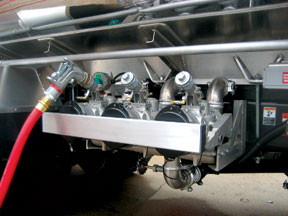
Civacon manifold mounted on a fuel truck.
Fleet owners can choose the manifold/air control combination that matches their own specifications and procedures, according to Robinson. The system helps to insure the operational sequence in which tank trucks are loaded or unloaded according to the fleet standard operating procedures. “What might be important to one fleet might not be important to another,” he explained. “This system is very customizable.”
The CivaControl system reduces the chance of driver error by simplifying the unloading process. For example, if a driver is refueling vehicles at a construction site, some equipment might use gas while others use diesel. The chore of switching compartments is made safer, simpler and much faster with the air operated manifold in conjunction with the intelligent air control system.
Civacon will work with fleets to help find the right solution for their particular needs in regards to the manifold and air control systems. “A lot of people don’t realize how flexible these systems can be,” Robinson said.
Civacon manifolds can also enable drivers to perform a product flush from ground level, through the manifold’s unique product return fittings. This saves time and eliminates the safety risk of climbing onto the top of the truck with a heavy hose in order to return product through a manhole, Robinson said.
Fleet owners can work directly with tank truck manufacturers or a Civacon sales representative to determine exactly which system configuration is right for them. The manifold “configurator” is a helpful tool when it comes to selecting a manifold system. Customers can customize a specific manifold by selecting various features and accessories to fit their own requirements, making it suitable for their particular needs and business operations.
Fleet owners may also be interested in Civacon’s ROMLink™ “Plug-N-Load” electronic overfill system. With it, the days of manual stripping and crimping dozens of wiring connections are now a thing of the past. Having a system that you can simply plug in and be done with dramatically improves reliability and makes troubleshooting a breeze. This overfill system can be installed much faster and is easily maintained. “The industry is going to look back 10 years from now and laugh at the way we used to wire an overfill system. This is just another example in which Civacon continually strives to engineer products that will improve efficiency and safety for the petroleum industry,” said Robinson.
Related Posts
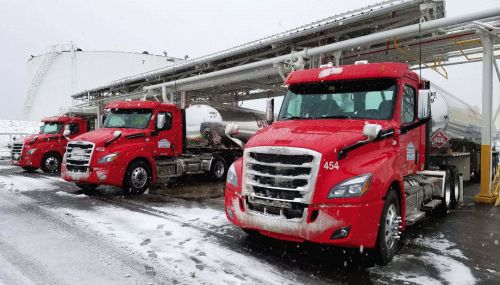 Optimizing Operations
Optimizing Operations
Posted on February 12, 2024
 National Weather Forecasting Takes NEFI by Storm
National Weather Forecasting Takes NEFI by Storm
Posted on December 8, 2023
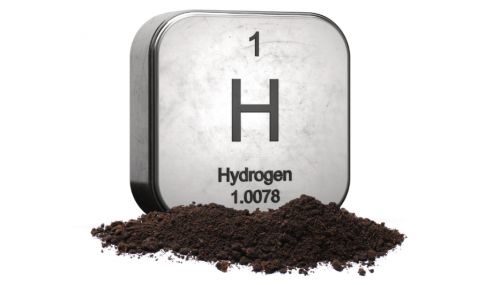 A Chance Hydrogen Discovery
A Chance Hydrogen Discovery
Posted on December 7, 2023
 Winter 2023-2024 First Impressions
Winter 2023-2024 First Impressions
Posted on October 11, 2023
Enter your email to receive important news and article updates.
